


 Space Travel? Space Travel?
 © Eric R. Pianka © Eric R. Pianka
 Spaceship Earth Spaceship Earth
Russian translation by Sandi Wolfe
From the beginnings of human history, we have been steadily
moving into previously unoccupied territories, conquering and
taming them as we go. In the olden days, the adage was ďGo west,
young man, go west.Ē This worked until we finally ran out of
wilderness when west met east (maps
showing the last wild areas).
Western Australia is as far west as you can go now. Westwards from
WA is the East. And so, we have encircled and conquered the
entirety of planet Earth.
Some naively think we could terraform the moon and inhabit it.
Of course, its gravitational forces are too weak to hold an
atmosphere, not to mention that human bones and musculature
cannot perform under such weak gravity. Moreover, even if we
could colonize the moon, its surface area is only about 1/10th
that of Earth, and we canít seem to take care of our own planet.
So, even if we could get to the moon, what's the point?
Using NASA's Kepler spacecraft, whose telescope has scanned more than 145,000 stars in
its search for distant planets, astronomers have now discoved hundreds new planets,
orbiting around distant stars. Kepler's telescope detects distant planets by a transit
method based on dimming of a distant star's light when a dark object passes across its
face. By painstaking re-analysis of tiny periodic changes in starlight, astronomers can
determine whether or not it's a planet. Many of these exo-planets are bigger than Earth,
a few are smaller. Astronomers have now discovered many other planets orbiting around
other stars all over the universe, even some that might have liquid water which is vital
to life as we know it. One such potentially aqueous planet, GJ667Cc, found in the
constellation Scorpio, is 5 times the size of Earth and is only 22 light years away
(129 trillion miles). Because it is close to its dim sun (around which it orbits every
28 days), temperatures are probably moderate. However, even if we could somehow reach
this distant short-yeared planet, if it is composed of rocks similar to those of our own planet
Earth, immense gravitational forces would crush any and all Earthlings (including us frail
humans). Assuming these distant planets are composed of materials similar to those that
make up our Earth, even if humans could reach the larger planets, gravitational forces
would simply be much too strong for our fragile Earthling bones and muscles.
Earth's gravitational forces are strong enough but not too strong. Likewise, temperatures
are nearly perfect for us. The oxygen content of Earth's atmosphere is also just about
correct for humans. We can find food and water almost everywhere except in arid deserts,
frozen polar habitats, and high up in the mountains. All this couldn't be mere coincidence,
could it? Rather than suspend reason and succumb to an irrational religious system of belief
that some god made Earth for us, consider a more sensible scientific alternative. Quite simply,
our planet is hospitable to us because, like every other denizen of this planet, we evolved
here and have thus become adapted by Natural Selection to Earth's conditions. Humans are
extremely versatile, and although we seem to think that we can exist outside the laws of
nature, we cannot. We are Earthlings first and foremost, and space and other planets will
always remain hostile environments for us.
 Mars is slightly smaller than Earth and close enough that we could actually reach it.
In late 1972, TIME magazine published an article suggesting that a
manned space flight to Mars might be possible. I wrote a letter to
the editor, part of which was published in the January 1st 1973
issue, as follows:
Mars is slightly smaller than Earth and close enough that we could actually reach it.
In late 1972, TIME magazine published an article suggesting that a
manned space flight to Mars might be possible. I wrote a letter to
the editor, part of which was published in the January 1st 1973
issue, as follows:
ďSir / Instead of six sex-starved men, letís send up three mated pairs
(women astronauts are long overdue), people with a real pioneering
spirit, and populate Mars.
One hopes that Martian-born humans will benefit from
our lessons on earth and take better care of their planet!
ERIC PIANKA
Austin, TexasĒ
|
I also mentioned taking a one-way trip to allow for materials
necessary to build biosphere greenhouses. I would revise my
advice now and send up only female colonists with seeds and
some frozen sperm. Such a strategy would double the number
of babies colonists could make, therby increasing chances of
successful colonization. Ironically, male babies would be born
off planet Earth (i.e., they would actually be Martians!)
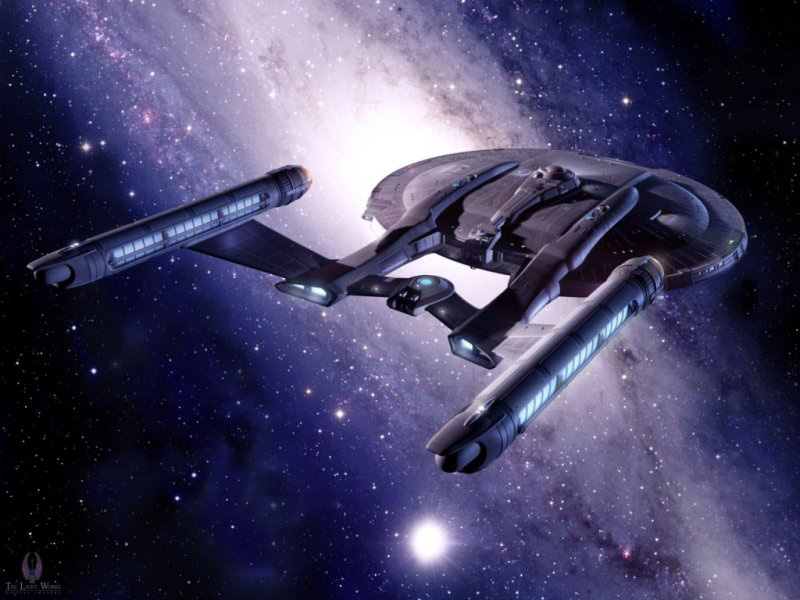
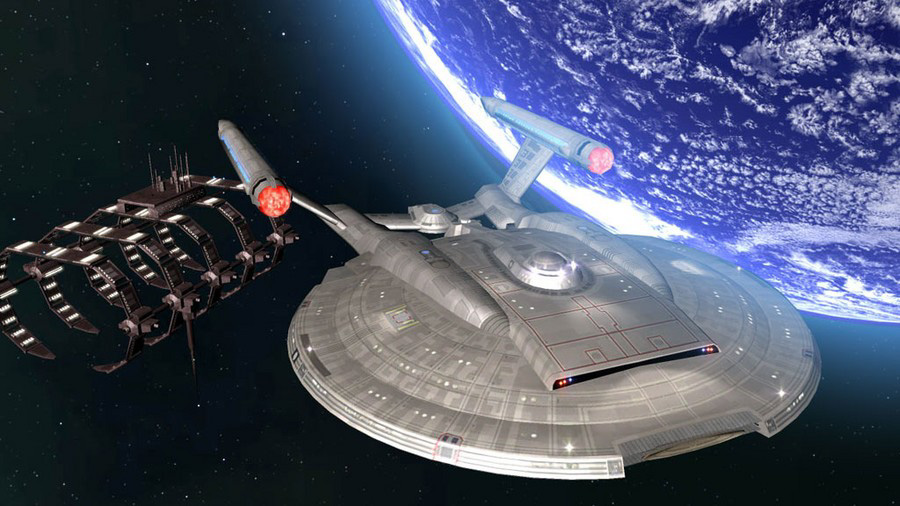
Science fiction has played a prominent role in our lives and many are
convinced that humans will ultimately leave
Spaceship Earth
(perhaps ďLifeboatĒ
is a better metaphor) and travel
throughout the Cosmos. Shows like Star Trek encourage this fantasy,
but few people have given enough thought to how totally dependent
we are on other life forms, let alone
how tied to Earth we actually
are. First, and foremost, like every other denizen of this planet,
we are, and will always be, Earthlings.
For humans to exist for long periods in outer space will require complex
life support systems, well beyond those currently available. In
addition to controlling things like temperature, gravity, and gases, we
must eat, and food cannot be created in magical replicator boxes as
depicted on TV. Rather, we will have to find means of growing food
on space ships. This will require much more space than anticipated,
probably more than is possible. Attempts at constructing self-contained
biospheres here on Earth have been limited but so far all
have failed. Nevertheless, a few diehard futurists still entertain
aspirations that humans will be able to live successfully in space (see,
for example, this
Space Colony.
We depend on other organisms for food, medicine, shelter, and
clothing. Simply put, humans could not exist without our
symbiotic bacteria,
microbiomes,
let alone without the endosymbiotic photosynthetic
chloroplasts housed by all green plants. Endosymbiosis, Other life forms,
Life that
lives on us, Dust mites.
Many of the genes that drive our physiology and metabolic processes were
invented billions of years ago by microbes in Earth's primeval oceans.
Even your own blood plasma reflects our ancient origin: it is very close
to sea water. We are but one small branch on the tree of life. We share
most of our genes with other organisms, including bacteria and fungi.
Space travel simply won't be possible unless we carry a substantial
biodiversity out with us.
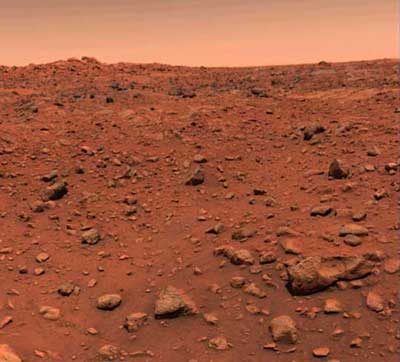 If we can, we ought to try to colonize Mars while itís still possible.
Some tough and brave pioneering women should go out on a one-way spaceship to Mars.
Their biggest challenge will be to build themselves a greenhouse to grow their own
food and hold in and recycle and re-use every molecule of oxygen and water.
If we can, we ought to try to colonize Mars while itís still possible.
Some tough and brave pioneering women should go out on a one-way spaceship to Mars.
Their biggest challenge will be to build themselves a greenhouse to grow their own
food and hold in and recycle and re-use every molecule of oxygen and water.
Mars gets awfully cold, so staying warm will be a challenge (the first colonists will probably
freeze to death if they donít die of thirst or starvation first!). It wonít be easy,
but successful colonists will have sweepstakes reproductive success by founding future
populations of humans. The whole idea of terraforming Mars to make it like Earth will
require centuries or millenia (if itís even possible!). You canít make an ocean or an
atmosphere quickly or easily! Yet both are essential to life as we know it on planet Earth.
We should take the Library of Congress up with us on flash drives so that when humans wink out
in this little sphere, there will be a record of what happened here on Earth somewhere else.
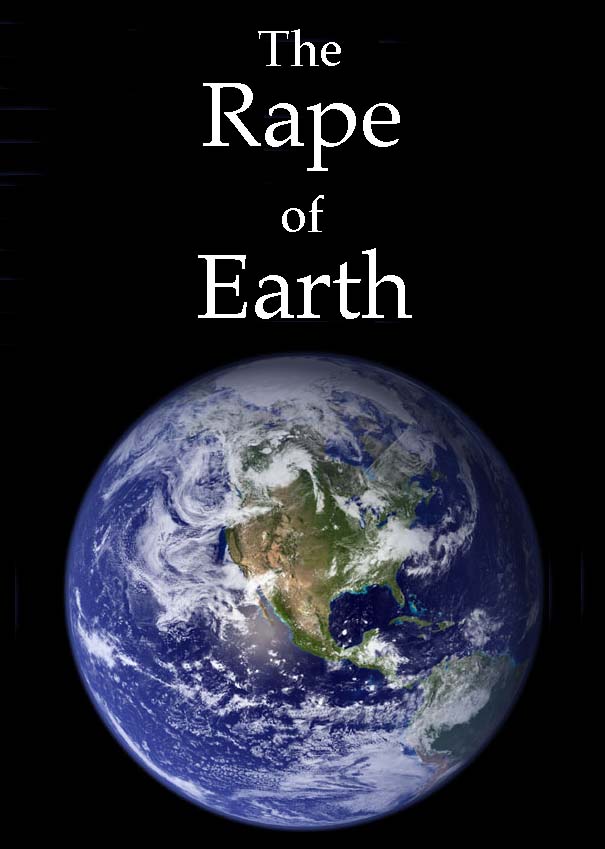 On that new planet, a book little kids read in kindergarten will be
ďThe Rape of Earth,Ē its lesson will be letís treat our new planet
better. But, based on past experience, it does not look as if humans
learn from one anotherís past mistakes.
On that new planet, a book little kids read in kindergarten will be
ďThe Rape of Earth,Ē its lesson will be letís treat our new planet
better. But, based on past experience, it does not look as if humans
learn from one anotherís past mistakes.
Certainly, conquest of space and getting humans and human
knowledge
off Earth is desirable and something we should strive to accomplish
before we destroy this planet and everything on it. A great deal of
energy is required to break free of the gravitational bonds of Earth,
so very few of us will be among the chosen few allowed to escape its
bonds.
If and when humans finally do depart from Earth, almost all of our
descendants will remain stuck here crowded together deadlocked
in a hopeless stalemate, competing for what (if any) limited
resources remain.
In this stalemate, those of us
who do care about Earth, by living an
ecologically sensible low impact life, in fact, are merely allowing
those who do not care
to continue raping the planet. Moreover, if those
who donít care
continue to have
more babies
than those who do care, humans will evolve by
natural selection to become uncaring humanoids.
Rather than be celebrated on
TV,
such people should be social outcasts, ostracized from society,
because they are stealing otherís rights to reproduce. Earth simply doesnít have enough
resources to support all of us in the style to which weíd like to
become accustomed.
In April 2014, NASA scientists announced an Earth-sized planet they named Kepler-186f
orbiting a relatively cool M-type red dwarf star "close by" only some 500 light-years
(2940 trillion miles) away in the Milky Way constellation Cygnus. Only a little larger
than Earth, Kepler-186f is the outermost of five small planets orbiting this feeble little
star. Kepler-186f's surface is most probably rocky. During its 130-day short annual orbit
around its sun, this right-sized planet stays entirely within a narrow habitable zone
(The so-called "Goldilock's zone")
just the correct
distance for surface temperatures to be neither too hot nor too cold for liquid water.
Because this planet could therefore hold reservoirs of water on its surface, astronomers
think it is the best candidate yet of a habitable planet in their ongoing search for
a planet B. But unfortunately 2.94 quadrillion miles is simply too far, we will never be
able to reach it. We must recognize and accept the fact that we are Earthlings, stuck here
for the long haul, and we must choose to take better care of this, what's left of our one
and only spaceship.
We could have been God-like, real stewards of this planet, but the
disparity between what humans could have been and what we
actually are is unforgiveable and a real tragedy.
If only more people would try to live up to their full potential.
-- Copyright, Eric R. Pianka, 2006
Download Can Humans Share Spaceship Earth?
Why Can't We Humans Share Spaceship Earth?
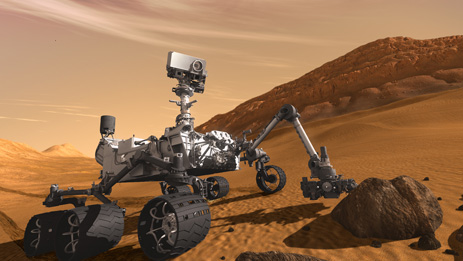
NOVA video about Mars robot Curiosity
|
|


 Mars is slightly smaller than Earth and close enough that we could actually reach it.
In late 1972, TIME magazine published an article suggesting that a
manned space flight to Mars might be possible. I wrote a letter to
the editor, part of which was published in the January 1st 1973
issue, as follows:
Mars is slightly smaller than Earth and close enough that we could actually reach it.
In late 1972, TIME magazine published an article suggesting that a
manned space flight to Mars might be possible. I wrote a letter to
the editor, part of which was published in the January 1st 1973
issue, as follows:


 If we can, we ought to try to colonize Mars while itís still possible.
Some tough and brave pioneering women should go out on a one-way spaceship to Mars.
Their biggest challenge will be to build themselves a greenhouse to grow their own
food and hold in and recycle and re-use every molecule of oxygen and water.
If we can, we ought to try to colonize Mars while itís still possible.
Some tough and brave pioneering women should go out on a one-way spaceship to Mars.
Their biggest challenge will be to build themselves a greenhouse to grow their own
food and hold in and recycle and re-use every molecule of oxygen and water.
 On that new planet, a book little kids read in kindergarten will be
ďThe Rape of Earth,Ē its lesson will be letís treat our new planet
better. But, based on past experience, it does not look as if humans
learn from one anotherís past mistakes.
On that new planet, a book little kids read in kindergarten will be
ďThe Rape of Earth,Ē its lesson will be letís treat our new planet
better. But, based on past experience, it does not look as if humans
learn from one anotherís past mistakes.
